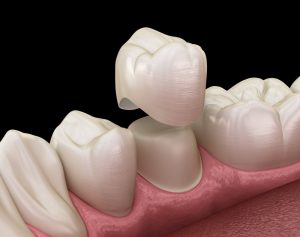A dental crown basically protects the tooth from any external damage after the root canal treatment.
Here are some reasons responsible for putting dental crowns after root canal treatment:

- Protect from damage/fracture
A tooth becomes weak to some extent after the root canal therapy that may cause damage to the tooth. In this condition, regular exposure to chewing and drinking can cause more damage to the tooth. It can cause chips and fracture in the tooth. A dental crown can protect the tooth from such kind of damage of the tooth.
- Maintain the appearance
In some cases, the color of the tooth changes after the root canal treatment. This might affect the aesthetic look especially of the front teeth. Now in such cases PFM or full ceramic crowns can be given as these types comes with the color of the tooth that can match properly with other neighboring teeth.
- Avoid any infection
There are chances of any infection to the tooth after the completion of the root canal treatment. Here, the dental crown can protect the tooth from further infection.
These are some of the main reasons for putting the dental crowns after the root canal treatment. A dental crown is commonly used by most people after root canal treatment.




